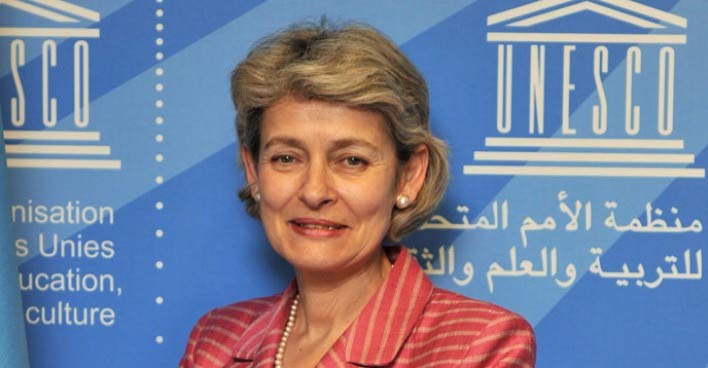Portugal’s António Guterres remains the favored candidate to become the next Secretary-General according to the UN Security Council’s fourth straw poll. The 15-member Council voted Friday morning on the 10 remaining candidates, casting 12 “Encourage” votes, two “Discourage” votes, and one “No Opinion” vote for Guterres, the former Prime Minister of Portugal and former UN High Commissioner for Refugees. Guterres has consistently stayed at the top of the polls; in this latest round, Slovakia’s foreign minister Miroslav Lajčák came in second with 10 Encourages, four Discourages, and one No Opinion, followed by Serbia’s former foreign minister Vuk Jeremić. Srgjan Kerim, a Macedonian diplomat and former General Assembly president, came in fourth.

Irina Bokova, a Bulgarian politician and director-general of UNESCO and the only woman to break into the top three of the polls (she tied with Jeremić for third place in the previous straw poll), came in a distant fifth. Argentina’s Susana Malcorra came in seventh, followed by New Zealand’s Helen Clark, Costa Rica’s Christiana Figueres and Moldova’s Natalia Gherman. There has never been a woman Secretary-General, and despite calls for a woman SG from advocacy groups and leaders, including Secretary-General Ban Ki-moon, the six female candidates have come up short in every round of the polls.
The Security Council is expected to hold the next straw poll on September 26th. The next head of the UN may well be decided in the subsequent round during the first week of October, when color-coded ballots will be used to signal the preference of the veto-wielding permanent members of the Security Council: China, France, Russia, the United Kingdom and the United States. In order to win, a candidate ultimately needs nine Encourage votes and must not be vetoed by any of the permanent members.
Security Council straw polls have taken place in some form since 1981; an informal and unregulated process, they have been likened to the famed, unscrupulous horse races of Palio di Siena, in Central Italy, where jockeys are known to use bribery and deceit to win. Ballots are cast anonymously and results are unofficially leaked, leaving both the press and the public guessing as to which countries are supporting which candidate. After this morning’s straw poll, journalists and diplomats alike were heard speculating that Guterres’ two Discourage votes came from Russia, which prefers an Eastern European as the next head of the UN, and New Zealand, the only country on the Security Council to have a candidate still in the running–Helen Clark, the former New Zealand prime minister and Administrator of the United Nations Development Program came in eighth, with six Encourages, seven Discourages and two No Opinion votes.
Current General Assembly President Mogens Lykketoft has repeatedly called for more transparency in the Secretary-General selection process. And because of Lykketoft, for the first time ever, the initial 12 candidates participated in open, informal dialogue sessions which allowed members of the public to submit questions. But there are no rules forcing the Security Council to choose a candidate from this group, and the five Permanent Members’ veto power all but ensures the final selection remains in the hands of the few.
After the fourth straw poll, UNGA President Lykketoft, released the following statement: “On behalf of the Security Council, H.E. Ambassador Churkin of Russia, informed me that the fourth informal straw poll of the Security Council for the position of Secretary-General took place earlier today. Thanking him, I also recalled my letter dated 21 July 2016 in which I recognize the informal nature of the straw polls, while stressing that the absence of any further details beyond the fact that the informal straw poll has taken place adds little value and does not live up to the expectations of the membership and the new standard of openness and transparency”.
In a recent interview with UN News, Lykketoft also said the gains made in transparency have been part of “delicate” and “game changing” process. “The Security Council has accepted each and every step we have taken. It has also changed the balance somewhat, I think, between what is happening in the General Assembly and what is happening in the Security Council,” he said. “I think what we have done has had substantial influence also on the priorities for the candidates in the Security Council. So this has been a game-changing process; of course we don’t know the outcome, but we know that the degree of transparency for the general membership to take part has come to stay; it will not be turned backwards again.”
Lykketoft also recognized that because the power to reform the Security Council lies for the most part with the Council itself, greater transparency would not be a reality any time soon. “We have a kind of Catch-22, because you can’t change the Security Council without having a two-third majority among the member states, and the ratification from the permanent five we have now. So that is, of course, the real explanation why this has been going on for more than twenty years without real progress.”
4th Round Straw Poll Results
Encourage – Discourage – No Opinion
António Guterres, 12-2-1
Miroslav Lajčák, 10-4-1
Vuk Jeremić, 9-4-2
Srgjan Kerim, 8-7-0
Irina Bokova, 7-5-3
Danilo Türk, 7-6-2
Susanna Malcorra, 7-7-1
Helen Clark, 6-7-2
Christiana Figueres 5-10-0
Natalia Gherman, 3-11-1












